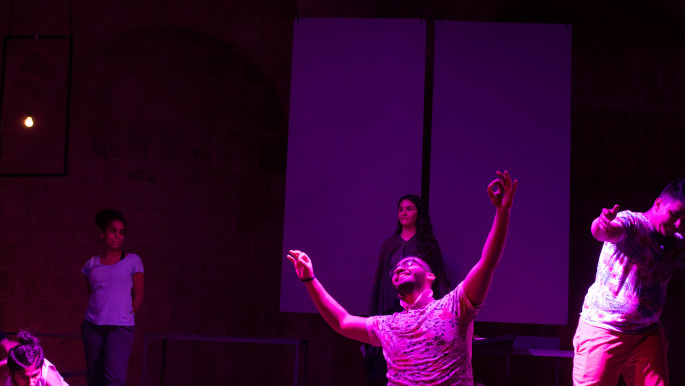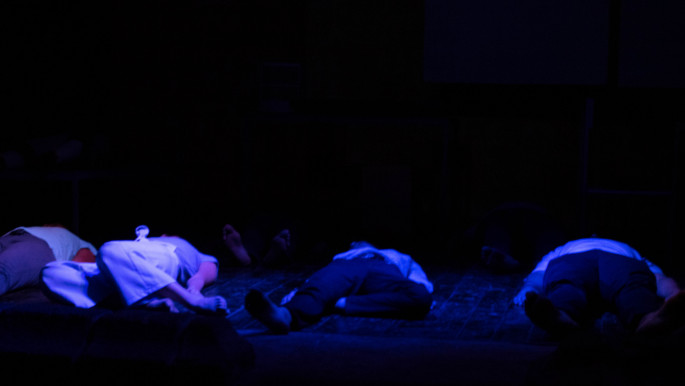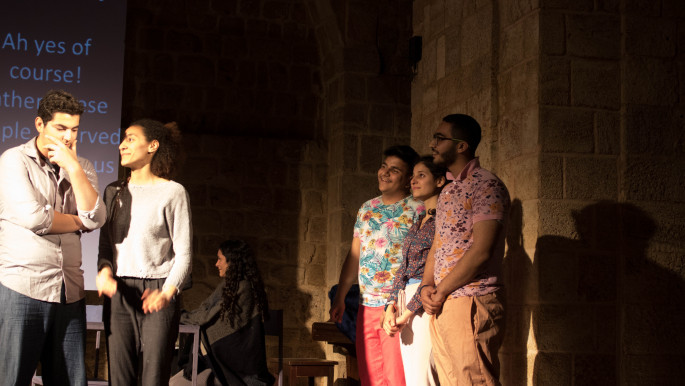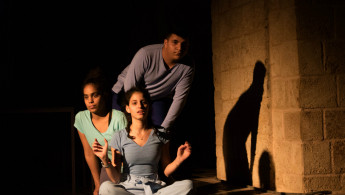Giving marginalised youth a voice in Lebanon through theatre
They laid on their backs on the floor, but one young man stood at the front of the stage with the sole light trained on him. He started to speak.
The performance had begun.
British NGO Seenaryo and the Yaabad Scouts have been working together in Lebanon for around five years, using theatre as a way for people, particularly youth, to express themselves and the struggles that they face on a daily basis.
Victoria Lupton, co-director of Seenaryo, explained: "Our project is really about transforming life chances for refugees through art, but also through education."
She later added: "We will build pieces of theatre collaborating with the groups from scratch. They will write the words, they will come up with scenarios, which is part of the reason for the name of the organisation, they will come up with scripts and, then, they will perform it at the end."
Lupton, who had previously lived in Lebanon, explained that following the start of the Syrian Civil War, she and her colleague felt that they needed to do something in order to give the Syrians seeking refuge in Lebanon a chance to express themselves.
 |
Our project is really about transforming life chances for refugees through art, but also through education |  |
She said, "Oscar and I had been old friends for many, many years, and I had been living in Lebanon working in contemporary art. I had moved to Lebanon in 2011, so it was really the beginning of the protests in Syria when the revolution was breaking out and it was one of the observations that I had that I was witness to the numbers of refugees coming into Lebanon, the streets being filled with homeless Syrians, the crisis in schooling in Lebanon, the crisis in provision of services for refugees and, particularly, the crisis in ensuring a kind of environment in which refugees in Lebanon are able to thrive rather than just survive.
"I really felt that as somebody involved with the arts that I had some kind of duty to respond to what was happening in Lebanon by creating artistic practices and artistic processes which could involve Syrian refugees and really have Syrian refugees at the heart of change and as artists themselves.
"We decided that with his [Oscar's] experience with arts and education in the UK and my experience with arts in Lebanon that we should do two show builds back in the summer of 2015.
"One show build was with a group of Syrian refugees in the Bekaa in collaboration with our biggest partners, or our most regular partners, Women Now for Development and the second week was with a group of Palestinian scouts in Shatila, called Yaabad Scout Troop, and I had known the Yaabad Scouts for some time."
 |
|
Lupton added that it is up to those that they are working with to decide how to go about the production with Seenaryo interfering as little as possible. She explained that this is what allowed for each production to truly belong to the communities.
Jamal Hendawi is a Palestinian refugee living in the Shatila Camp who, along with youth in the community, founded the Yaabad Scouts as a way of interacting with the children in their community and to allow these children to work more with their passions.
Hendawi said, "We got together and discussed our duty towards our [the Palestinian] case, but we thought that it was not enough and that we needed to do something more for the society. So, we came up with the idea of forming a scout group.
"At first, we didn't know what we wanted to do with the kids, but we knew that we wanted to do something. When we started the scouts, we realised that it was a really good outlet to teach manners and other skills. Discipline and cooperation are the base for everything in the future.
"We then started discovering the children's talents and ideas. Originally, we got together at my friend's house to discuss what to do."
 |
When we started the scouts, we realised that it was a really good outlet to teach manners and other skills. Discipline and cooperation are the base for everything in the future |  |
It was not only the Palestinians, though, that Yaabad looks to help as Hendawi explained.
He said, "The children are from everywhere. From the refugee camp, from the surrounding areas. Others live far from the school.
"We call the scouts 'the Big Family'. So, if you come to the scouts you are a part of the family no matter who you are. We accept them as they are."
When asked why he volunteers to do this in addition to his daily job, Hendawi explained, "Some people, in their free time, like to go to the coffee shop or go fishing. I like spending time with people. Especially children. I feel like that it is not only my duty, but I enjoy it. I do this for fun."
However, soon after forming the group, Hendawi was left to work on the project alone with his wife, Mona.
He said: "My wife, Mona, joined me in my work. We both have a passion for art, and I used to act with the National Theatre group. My acting was all about the Palestinian cause. From here we started working with the children with the things that we had and what we knew, and we eventually learned knew things to work with them.
"For example, with football. If one child loved it and we didn't know anything about it we would have to learn. If a child had a serious passion about something, we would use our connections to send that child to go learn and play football. They would be involved with the scouts and practice their passion too.
"If the child shows passion towards theatre and arts, we wold take care of it. We used to perform sketches for the kids. We would go to the Beirut for Arts Centre in Sin el-Fil and by going to this centre we made connections. One of these was Seenaryo."
Hendawi spoke highly of the British NGO, saying that because of the way that they worked with the people in the communities, they were able to work extremely well together.
He said, "Seenaryo has a special was of dealing with kids. A fun technique and it was very similar to the way that we work. So, we started working with them and it has now been four or five years since we started.
"Every year in the summer we collaborate on a project for a week and at the end of the week we perform a play and, then, we do one or two shows depending on the circumstances."
He later added, "Seenaryo usually tries to get children together form the ages of six and up and they try to make them the scenario of the play and they write the scenes and write the songs. If someone has nice voice, then they will sing too. They also choose out their own outfits and choose the decor and the accessories and so on.
"They allow them to act the way that they are comfortable; without the usual restrictions that come with acting. The end result is something beautiful where the children are able to vent out through making this play and share their ideas and express themselves. The team from Seenaryo works with us on the dancing and the sports part. We really benefit from them a lot. Especially the Scouts."
 |
|
Lupton also praised Hendawi and the scouts for their ability to not only involved Palestinians in their work, but people coming from all types of backgrounds.
She explained, "The Yaabad Scout Troop and Jamal are incredible at very regularly involving all of the young people in the different arts experiences in the city that they can do which I think is really rare for a kind of grassroots, self-funded, self-sustaining Shatila-based organisation. To have people who are so open, who really want to be initiating new collaborations, making new links with different organisations locally and internationally."
After meeting at Beirut Art Centre Hendawi raised the idea of the two groups working together to do a production in Shatila.
Lupton said, "The Hendawi's knew that I was involved in theatre and that was one of the initial kind of impetuses to begin Seenaryo was when I had a meeting with the Hendawi's in Shatila and they said, 'Why don't you do a theatre project with us in Shatila?' And that was really when things started to come together and this whole idea of doing a show build in Shatila came together.
"The very first week that we ever did Seenaryo was with Jamal and the Yaabad Scouts. We've now done four years of show builds in Shatila. We did a tour after the second show build which went to five different cities or five different spaces across Lebanon that was funded by the Qattan Foundation.
"We have trained two of the older Hendawi children, so that's Jamal and Jihad, who have been trainees for us. And we've actually employed them, we hired them to do various pieces of work for us as well trainers, as leaders. So, the second year we did our show build, Jamal Hendawi came with us to the Bekaa Valley and he was one of the leaders, one of the facilitators in one of the processes."
 |
Our vision isn't solely about integration, it's also about transforming the life chances of refugees. So, that might be upscaling young people, that might be by empowering them socially, so allowing them to feel more confident, to be better at communicating, to feel more secure in groups, to be able to socialise better |  |
The most recent production that Seenaryo and the Yaabad Scouts worked on together was an interpretation of Kafka's Metamorphosis which was premiered at Hamra's Masrah al-Madina (City Theatre) as part of the European-Lebanese Theatre Festival which happened in October.
This production has now toured Sidon, the Beirut Arts Centre as well as Tripoli at the start of March.
Lupton explained that she found this production so extortionary because of the amount of collaboration and the vast diversity with the young adults taking part in the performance.
According to Lupton, they collaborated "with the UNHCR, with INTERSOS, with Dar Itam al-Islamiyya which is the orphanage in Lebanon and Yaabad Scout Troops, so that has Syrians, Palestinians and Lebanese all working together. All from marginalised backgrounds".
According to Hendawi, he believes that Seenaryo's purpose "by doing this is not only to create this play, but in the long run, teach the children to do the same with other so that they can express themselves even without Seenaryo".
Lupton elaborated further by explaining: "Our vision isn't solely about integration, it's also about transforming the life chances of refugees. So, that might be upscaling young people, that might be by empowering them socially, so allowing them to feel more confident, to be better at communicating, to feel more secure in groups, to be able to socialise better, it might be by training young people in leadership, it might be, when it comes to our teacher training work, empowering teachers to enjoy their schools better and, also, the kind of trickle down of that is providing a better learning experience for our young learners who are at the kindergarten level.
"So, there are a bunch of different ways that we are building capacity. We're really focused on building skills, we're really imbedding new models for learning. Two of our objectives are about social cohesion which means social cohesion between Syrian, Lebanese and Palestinian groups and which are about challenging assumptions of audiences."
 |
|
While Lupton acknowledged that the situation involving refugees in Lebanon has become "very difficult", she explained that she hoped that, through Seenaryo's work, it could help change perceptions and views towards marginalised groups in Lebanon.
 |
Many of the Syrians had never been friends with any of the Lebanese or Palestinians before. The Lebanese had never visited Shatila camp before. The Palestinians didn't really understand necessarily where Syrians were coming from |  |
She said: "You can't come in with a piece of theatre and change things overnight, but I do believe that starting from a very grassroots level, the type of work that we do bringing in different groups of refugees and audiences as well is extremely important in challenging assumptions."
With the Metamorphosis interpretation, Lupton explained that those who took part now see each other as being friends for life.
She said: "You have it that these young people are friends for life now. That's very clear. I really believe that. And they said very clearly that this process had really change the way that they think about people of different nationalities living in Lebanon.
"Many of the Syrians had never been friends with any of the Lebanese or Palestinians before. The Lebanese had never visited Shatila camp before. The Palestinians didn't really understand necessarily where Syrians were coming from. They all made these kinds of statements in the final evaluation and said that this has really transformed the way that they look at things.
"We also did some evaluation of the audiences after our Metamorphosis production and audiences were really saying that this is kind of allowing the voices of young people to be heard and young voices who have not really been heard in Lebanese society."
Many of the young adults who took part in the production confirmed this.
 |
|
Rania Jamal, a Lebanese orphan, said, "First we were shy about talking with each other. But through a lot of exercises and a lot of games and a lot of rehearsals together, we got the chance to trust each other and to talk with each other without any limitations.
"Then we found out that we all have problems and that we need to solve them and that it is okay to be different."
Syrian Tasneem Rahub also said that they were shy at first.
She said, "When we started, we used to be very shy and only spoke when we were told to. We sat in our groups, the Palestinians with the Palestinians and the Syrians with the Syrians etc., but we eventually became like a family.
"We started seeing each other every day for long hours and eating together and doing things together. We used to do this every day. Lama would send us the schedule and we had to do everything. So, it became part of our life. When someone would miss a session, we would feel like we were missing something.
"I will definitely remain friends with my crew even after this is done."
While the groups help to allow the youth to express their everyday challenges, Hendawi explained that they are not affiliated with any political group and try to avoid taking a political position.
He said: "We only help to direct the children to discuss their personal experiences, their miseries and things that they go through. While we focus on these things, we don't make a play about going against Israel because there are already other organisations talking about these issues. So, they talk about their own experiences without going political."
Those involved in the production of Metamorphosis explained that doing this meant a lot to them as they could come together as one and show that while they are from different backgrounds, they were still human beings who faced problems everyday just like everyone else.
 |
|
Jamal said: "It was nice. I made new friends and I developed my hobbies and I had the opportunity to dance in front of more people and act and send my message to a lot of people. I was able to talk about races, about black people, and about what it is like being an orphan.
"It meant a lot to me. I had the chance to dance and to send one message that I, as an orphan and a black person, that we are equal to other people and that we have the chance to live like everyone else. That we are not different from others. Being an orphan is not a big deal. I just have to deal with it.
"It made me feel more confident about myself and it made me feel like I was able to express myself to a lot of people. I used to not have the courage to talk in front of a lot of people about my problems, but with this play, I had the chance to talk, to let my feelings out."
 |
It made me feel more confident about myself and it made me feel like I was able to express myself to a lot of people. I used to not have the courage to talk in front of a lot of people about my problems, but with this play, I had the chance to talk, to let my feelings out |  |
Abdel Jalil Dahshe, a Palestinian who is involved with Yaabad Scouts, said: "After every performance we have 10 minutes where we speak with the audience. We receive questions from them, and we answer. In every region the reaction is different. In general, the reactions are positive.
"Working with Seenaryo, every individual has this hobby, to act, but with the group they teach us more and how to develop this passion. We practice and they teach us how to show others how to practice. During a workshop in Tripoli, we taught younger children how to grow their talents.
"For each person acting, it means something different. For the person playing the insect, he is saying that this is how the Western society sees us. As insects. Also, how people are racist towards to Palestinian people.
"So, through this, we are able to have our voices heard by people and the Western society. And because each actor is from a different background, we are saying that there should not be any differences between us."
Rahub explained that by doing this, her preconceived notions about people of different backgrounds working together were changed.
She said: "It was very nice. I got the chance to get to know new things and new cultures. Before joining, I thought that people from different backgrounds, I thought that it would be hard to deal with one another. But after joining, I realised that it was not like this at all. We came together and we became one. Even though we come from different backgrounds, we are still part of the Arab community.
"We started writing stories about our lives and, through this activity, everything started to come out. The way we felt. And we discovered that our stories are very similar to the Kafka story [Metamorphosis]. Then we started reading the story and, when it related closely to how we were feeling, we included it."
The lights came back on and the cast took the stage one final time, hand-in-hand. They stood at the front of the stage and bowed as the crowd greeted them with thunderous applause.
Nicholas Frakes is a freelance journalist who reports from London, the Middle East and North Africa.
Follow him on Twitter: @nicfrakesjourno



